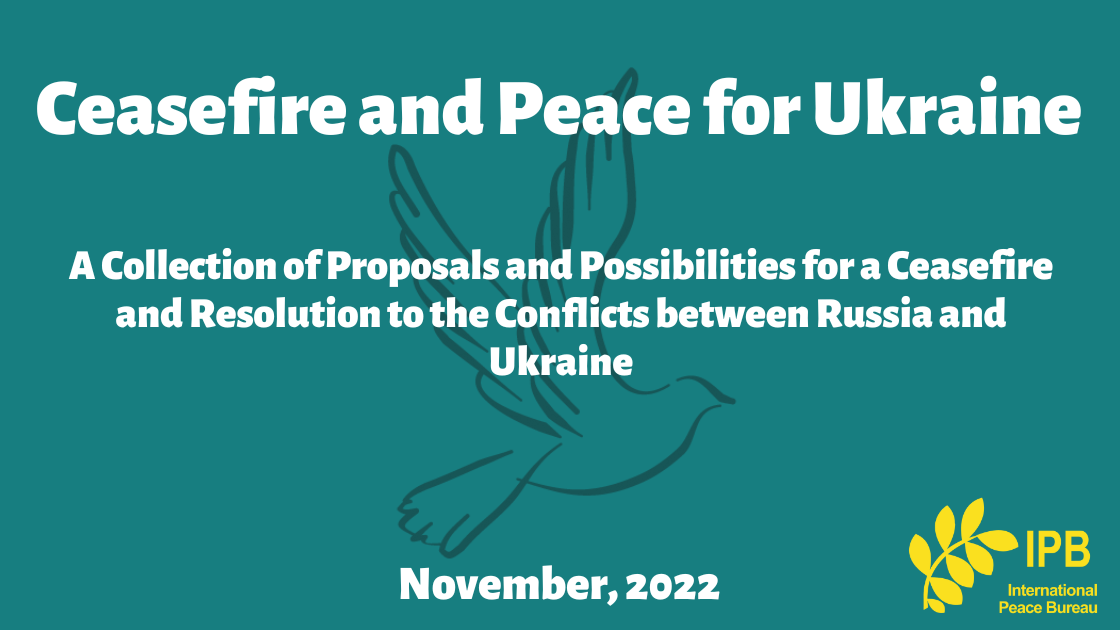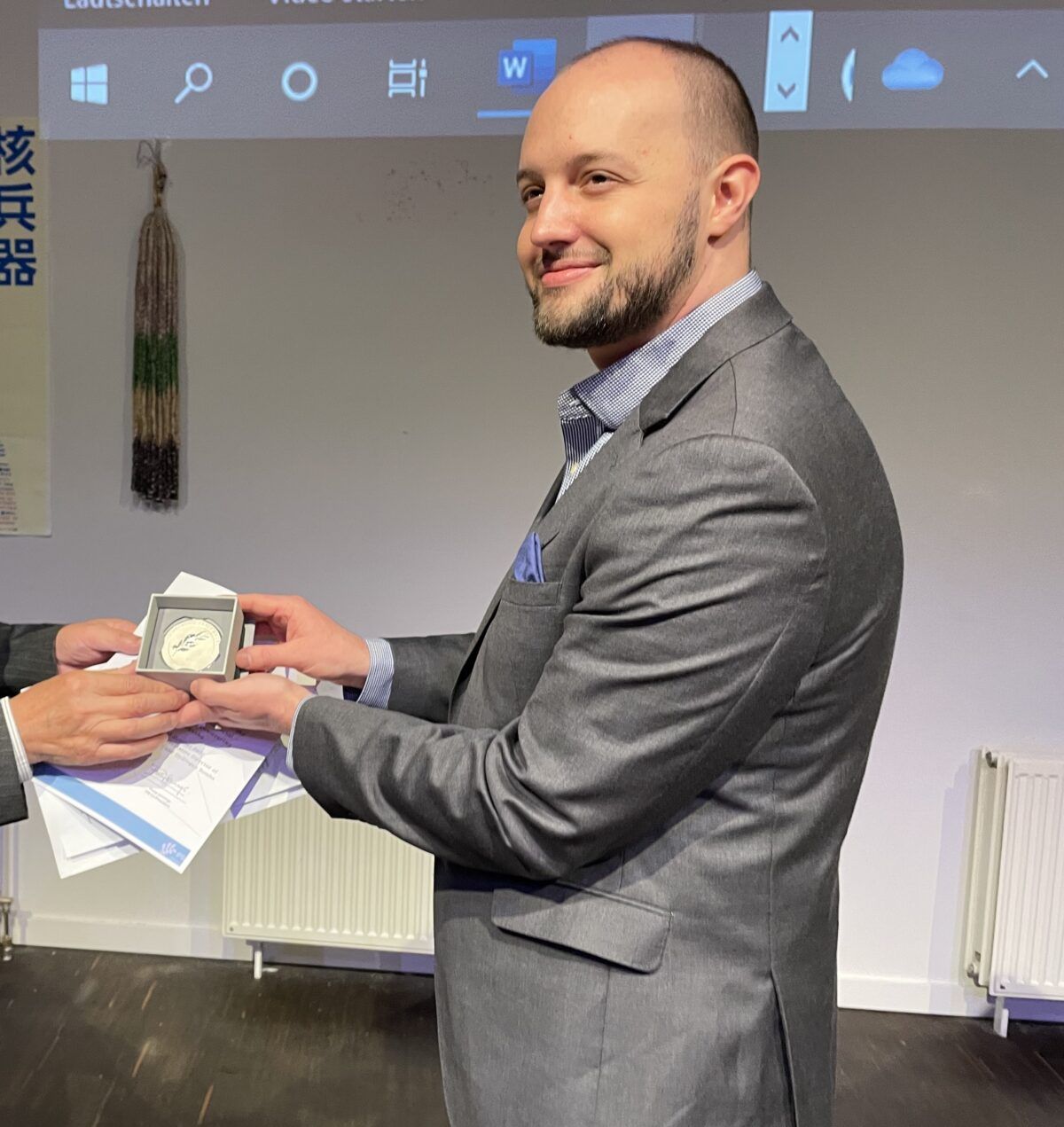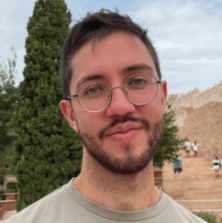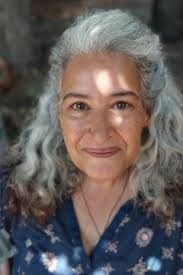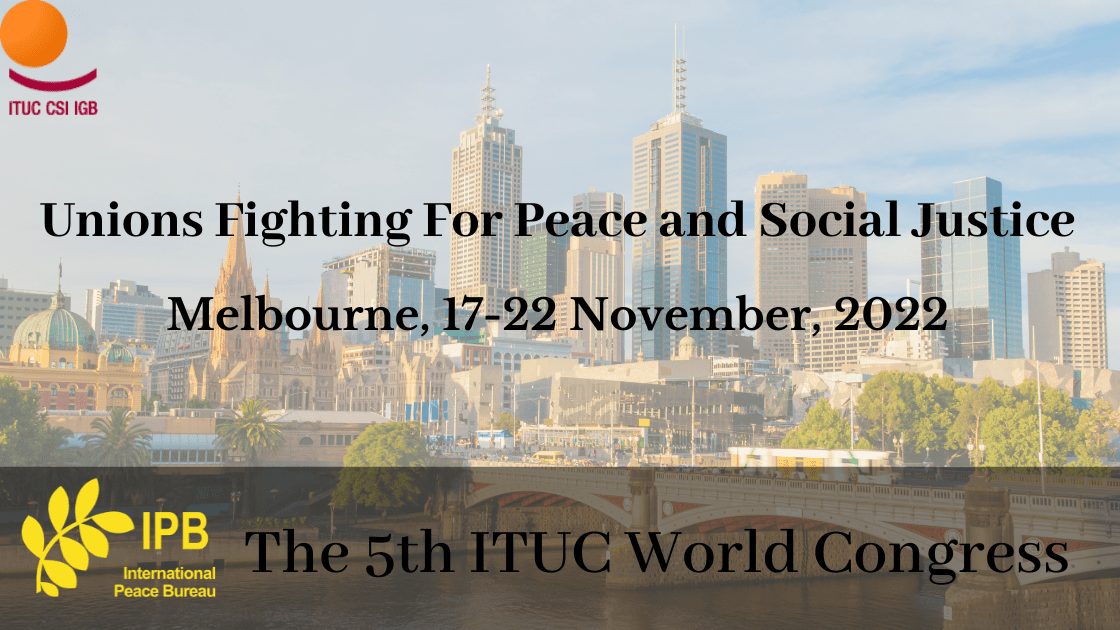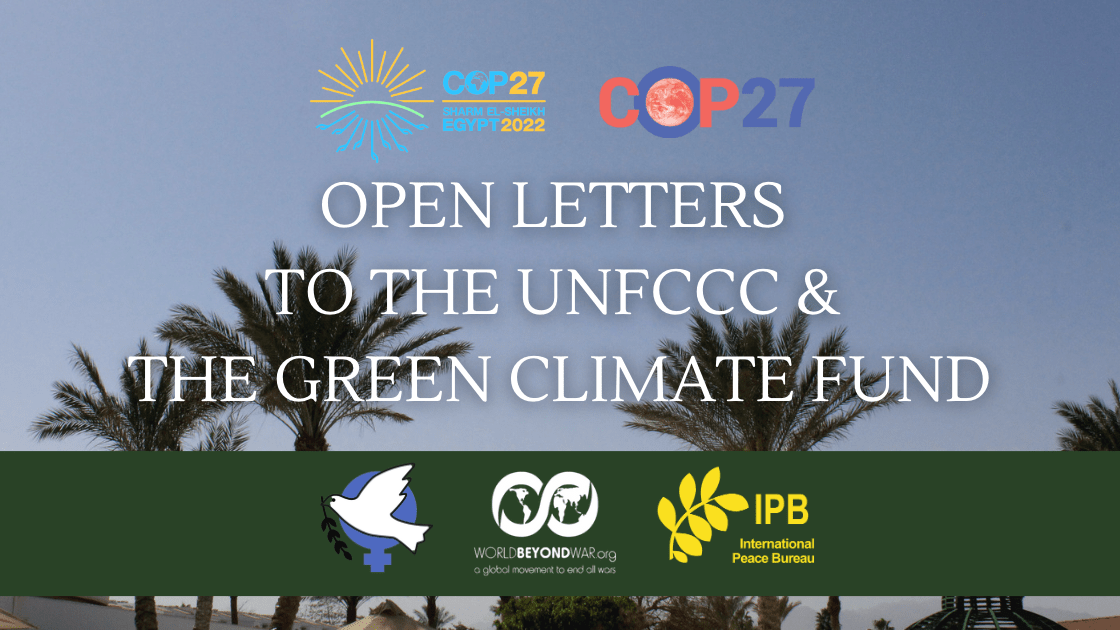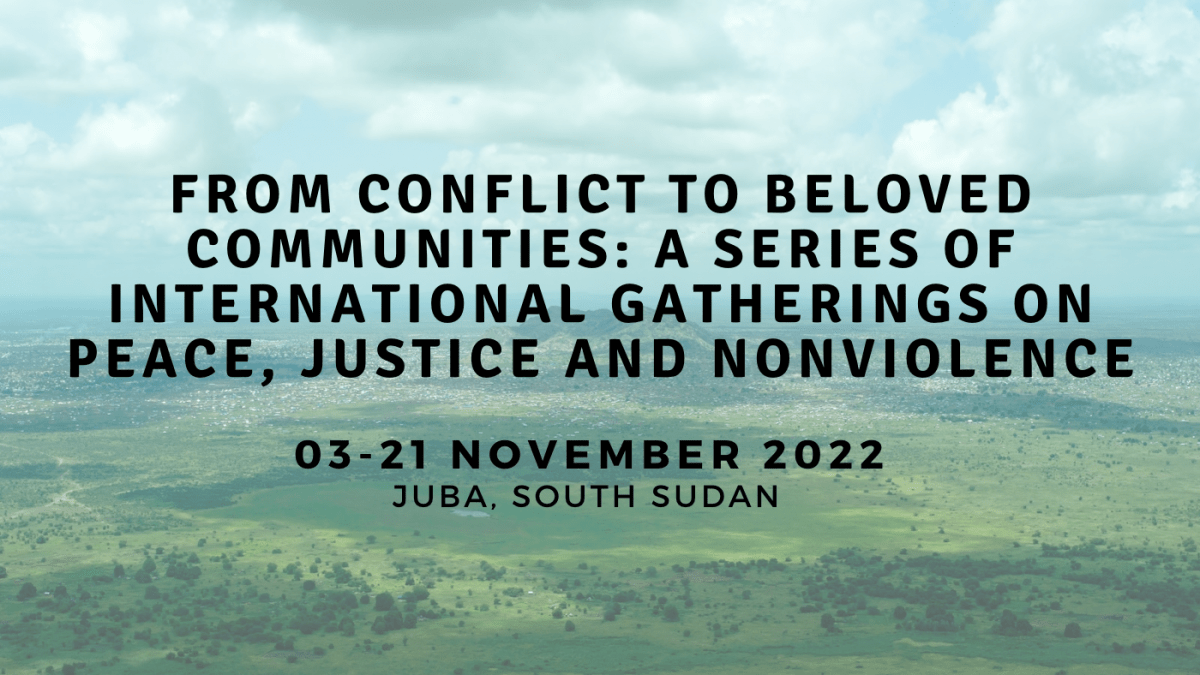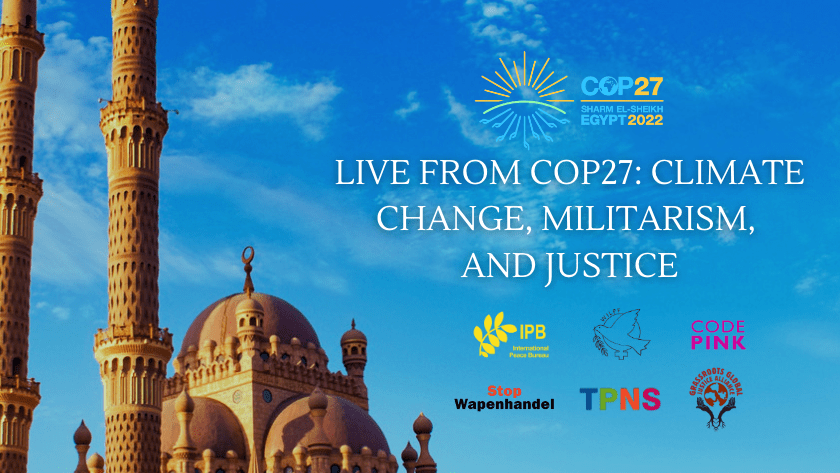The International Peace Bureau has put together a collection of proposals and possibilities for a ceasefire and resolution to the conflicts between Russia and Ukraine.
Continue reading “Ceasefire and Peace for Ukraine”Author: Assistant Coordinator
Sean Conner – Executive Director
Sean Conner was appointed Executive Director of IPB in October 2022. He holds a Bachelors in Intercultural and Critical Communication Studies from the State University of New York at Geneseo and a Masters in Intercultural Conflict Management from the Alice Salomon Hochschule. Continue reading “Sean Conner – Executive Director”
Theo V. S. Ferreira
Theo Valois Souza Ferreira joined our team in May 2022 and completed his experience with us in May 2023.
He holds a Bachelor’s degree in International Relations from the Universidade Federal de Uberlândia (UFU-Brazil), and a Master’s degree in International Relations and European Studies from the Universidade de Évora (Portugal), with intern stays at the Instituto de la Paz y los Conflictos (UGR-Granada, Spain) and at the Department of Peace and Conflict Research of Uppsala Universitet (Sweden). Planning to start a Ph.D. in the second half of 2023.
Continue reading “Theo V. S. Ferreira”Alessandra Fontanella
Alessandra Fontanella joined IPB as Assistant Coordinator in September, 2022.
She is currently working towards an MA in International Cooperation at the University of Turin, Italy and is focusing her research on food insecurity and conflict. Alessandra holds a BA in Foreign Languages and an MA in International Relations. Previously, she has worked in ethical data analysis and administration.
Conference Review: ‘From Conflict to Beloved Communities: A Series of International Gatherings on Peace, Justice and Nonviolence’ in Juba, South Sudan
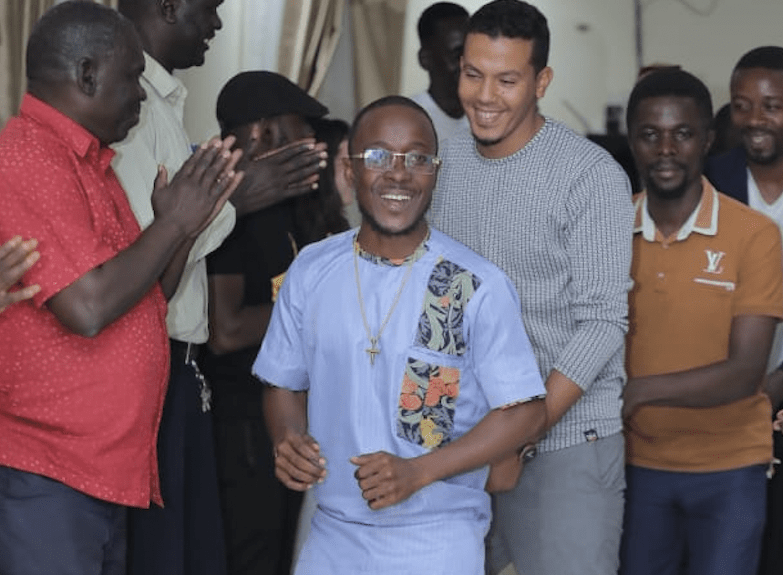
From 03-21 November, the Province of the Episcopal Church of South Sudan in conjunction with the Organization for Nonviolence and Development hosted the conference “From Conflict to Beloved Communities: A Series of International Gatherings on Peace, Justice and Nonviolence.”
IPB council member and Executive Director of 4kids International, Tyson Smith Berry Jr., hosted IPB Day at the conference on 08 November. The program, titled “Climate Change & Common Security: challenges and solutions in Africa and the world at large,” included various seminars and workshops.
Read Tyson’s report here:
Click here to learn more about IPB Day in Juba!
Matt Meyer, Secretary-General of the International Peace Research Association (IPRA), also shared afterthoughts from the events in Juba:
Sharon Dolev – Board Member
Sharon Dolev was elected as a board member in 2025 and is a former IPB council member (2022-2025).
She is a peace and human rights activist with a focus on eradicating nuclear and other weapons of mass destruction from the Middle East through innovative policy, education, advocacy and activism. She is the founder and director of the Israeli Disarmament Movement (IDM), the Middle East Treaty Organization (METO) and Israeli representative of the 2017 Noble Peace Prize laureate International Campaign to Abolish Nuclear Weapons (ICAN).
Continue reading “Sharon Dolev – Board Member”The 5th ITUC World Congress
The 5th ITUC World Congress in Australia has celebrated the role of trade unions in peace-building, without which there can be no social justice.
Presenting the Freedom Report 2022: Unions Building Peace to the delegates, ITUC General Secretary Sharan Burrow said: “Some two billion people live in conflict-affected countries, with 56 state-based conflicts in the world today.
“International humanitarian trade union solidarity, such as the major efforts to support workers in Ukraine, Myanmar and elsewhere, is part of a broader framework of trade union efforts to build and sustain peace and to avoid conflicts and rebuild in their aftermath. The world must learn from this example.
“If world leaders can come together to look at addressing the threats from climate change, then it should also invest in global dialogue on measures to prevent conflict, to end existing conflicts and to rebuild in the aftermath of war in a just and sustainable way.
“There are many examples of trade union action for peace, justice and democracy. We take pride in these achievements and the inspiration we draw from them will help unions everywhere plan and campaign for fundamental freedoms, democracy and peace.”
The report includes case studies from:
• In Colombia, unions have been at the forefront of decades of struggle for peace and social justice.
• In Northern Ireland, the trade union movement has long been a motor for peace and overcoming division and sectarianism.
• In Myanmar, the unions continue their longstanding peace and democracy struggle in the most difficult and dangerous circumstances under a ruthless military dictatorship.
• In Tunisia, the UGTT and others were awarded the Nobel Peace Prize for their work to build a post-dictatorship country with a new constitution. A commitment that remains just as strong as the country faces new challenges.
Open Letter Launch on military spending and climate finance
In a collaboration between the Women’s International League for Peace and Freedom (WILPF) , World BEYOND War (WBW), and the International Peace Bureau (IPB), we come to present you two Open Letters written especifically for the occasion of the COP27 happening in Sharm el-Sheikh, Egipt from the 6th to the 18th of November.
The first letter is addressed as an Appeal to the United Nations Framework Convention on Climate Chang (UNFCCC) to Study Climate Impacts of Military Emissions and Military Spending for Climate Financing. The second one, as a Global Appeal to Reduce Military Spending and Re-Allocate to Climate Financing, is addressed to Yannick Glemarec, Executive Director of the Green Climate Fund.
“It is inconceivable that while millions of people are waiting for vaccines, medicines or food to save their lives, the richest countries continue to prioritize their resources in armaments at the expense of people’s well-being, climate, health and equitable recovery.”
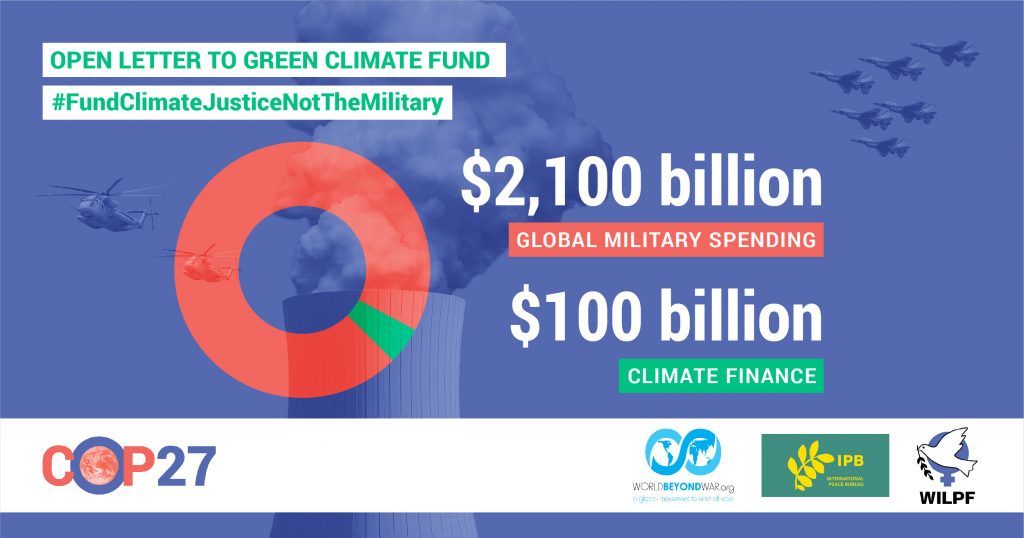
We appeal to the UNFCCC and the IPCC to do a special report and assessment of the climate impacts of war and the military. Global military spending has risen to over $2.1 trillion USD. We urge the UNFCCC to call on member states to cut military spending for climate financing.
In 2021, global military spending rose to $2.1 trillion (USD), the highest ever in history. This is 20 times more than the $100 billion pledged for climate finance, a target that Western countries failed to meet.
The military is the largest consumer of fossil fuels and biggest carbon emitter in the governments of state parties. Countries must demilitarize to decarbonize.
Military emissions and expenditures are derailing progress on the Paris Agreement. Peace, disarmament and demilitarisation are vital to mitigation, transformational adaptation, and climate justice. We also appeal to the Green Climate Fund to study the reduction and re-allocation of military spending for climate financing facilities.
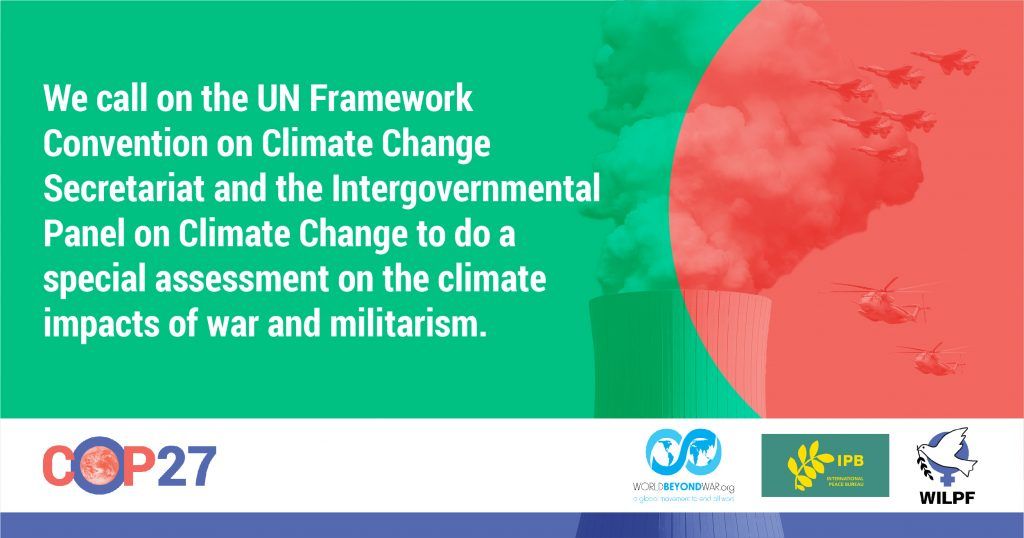
Conference Program: ‘From Conflict to Beloved Communities: A Series of International Gatherings on Peace, Justice and Nonviolence’ in Juba, South Sudan
“From Conflict to Beloved Communities: A Series of International Gatherings on Peace, Justice and Nonviolence” is being hosted by the Province of the Episcopal Church of South Sudan in conjunction with the Organization for Nonviolence and Development.
Full program:
IPB council member and Executive Director of 4kids International, Tyson Smith Berry Jr., will be hosting IPB Day at the conference. The program is taking place on November 8, at 3-5pm CAT (2-4pm CET) under the title “Climate Change & Common Security: challenges and solutions in Africa and the world at large.”
To learn more about IPB Day, click here!
Live from COP27: Climate Change, Militarism, and Justice
The Conference of the Parties (COP27), taking place from 6-18 November in Sharm el-Sheikh, Egypt, intends to bring nations together in a new era of implementation by turning their commitments under the Paris Agreement into action. In the midst of the discussions to happen, how can climate change, militarism, and justice be approached to build an environment of peace?
Join us live from COP27:
Monday, 7 November | 12.00 CET
What to expect from cop27: How is Militarism (not) Addressed?
Join the International Peace Bureau and CODEPINK as Nancy Mancias gives us the first impressions on the ground in Sharm El-Sheikh at the start of COP27. The discussion will include what is expected to take place in the first week, the atmosphere of a COP in the context of a militarized police state, and the overlap of peace and climate.
Registration: bit.ly/COP27LIVE
Wednesday, 9 November | 16.00 CET/10.00 EST
COP27 Finance Day: Cut Military Spending for Climate Finance
Join IPB and WILPF for a conversation led by Tamara Lorincz, who will provide us insights into what activists are doing in Sharm El-Sheikh to push for reductions in military spending as a tool to support the climate transition and to provide funding for loss and damage resulting from climate change. We will discuss the open letters to the UNFCC and Green Climate Fund, the controversial F-35 carbon impact, and how these ideas are being brought forward at COP27.
Registration: https://bit.ly/COP27LIVE3
Saturday, 12 November | 17.00 CET/11.00 EST
Week 1 Wrap-Up: What have we learned? What to expect in week 2?
Join the International Peace Bureau and CODEPINK as Nancy Mancias shares her experiences from the first week of COP27 in Sharm El-Sheikh, including the range of civil society activities in the Green Zone, established connections between peace and climate, and what to expect for the second week.
Registration: bit.ly/COP27LIVE2
Tuesday, 15 November | 13.00 CET
Emissions and Spending – A Report from the Blue Zone
Join IPB and Tipping Point North South for a conversation led by Deborah Burton, who will share the results of her organization’s official COP side event, which includes the launching of a methodology around counting of military emissions. We will also discuss a newly-released briefing on military spending and explore the COP’s Blue Zone.
Registration: https://bit.ly/COP27LIVE4
Thursday, 17 November | 19.00 CET/13.00 EST
No War, No Warming: Demilitarization and Climate Justice
Join IPB and Ramon Mejia of the Grassroots Global Justice Alliance for a conversation about their groundbreaking events “No War, No Warming” in the Blue Zone of COP27 and further activities in Sharm El-Sheikh to fight for climate justice and peace.
Registration: https://bit.ly/COP27LIVE5

